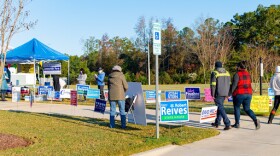Preparations for the 2020 Census are underway in North Carolina, one of the fastest growing states in the nation poised to get another congressional seat after the decennial count.Many organizations representing immigrant communities were upset and worried when the Trump Administration tried to add a citizenship question to the Census. A federal judge in New York ruled against the proposed language, calling it "unlawful."
Stacey Carless, executive director of the NC Counts Coalition, says the 2020 Census count won’t be easy with the cut in federal funding for the Census and the debate over citizenship questions. But she says there will be a team on the ground.
“We are trying to work with ‘trusted messengers,' said Carless. "We believe that it’s the people who are on the ground, who communicate with individuals from hard-to-count communities every day, who can get the word out and encourage then to participate in the Census.”
Carolina Demography, a part of the Carolina Population Center at UNC Chapel Hill, has developed a mapping tool for the NC Counts Coalition to help determine where North Carolina's hardest-to-count communities are located. For example, Orange County has a score of "1 out of 5" for being least hardest to count. There are many rental properties in Orange County, but relatively no mobile homes or overcrowding. Person County has a score of "5," making it hardest to count.
Carless said the plan is to have staff working in the 10 hardest-to-count communities on a full-time basis, starting in June 2019 until the end of the 2020 Census count.
"I want to make sure every individual is counted equally," said Carless. "Being counted should be empowering."
The mapping tool shows the hardest-to-count communities often have a high percentage of minorities, rental housing, young children and likely no regular access to the internet, according to Rebecca Tippett, who heads Carolina Demography.
"And they are hard to locate, hard to interview, hard to contact and hard to persuade," Tippett said during Thursday's "Making NC Count" statewide census convening, at a gathering in Raleigh.
This will also be the first census where residents can fill out their census questionnaire online, according to Bob Coats, Governor Roy Cooper’s Census liaison and coordinator of the North Carolina Data Center.
“But the good news about it is it’s not an internet only Census," Coats said. "So, if you prefer to get your questionnaire in paper you can do that. Also, if you don’t have internet access in your home, but the local public library or the community center does, you can use those local connection points as a point to fill out your Census.”
The North Carolina Complete Count Commission is encouraging people to start applying for Census worker positions now. The first two North Carolina field offices will open in the Raleigh and Charlotte areas this spring.







